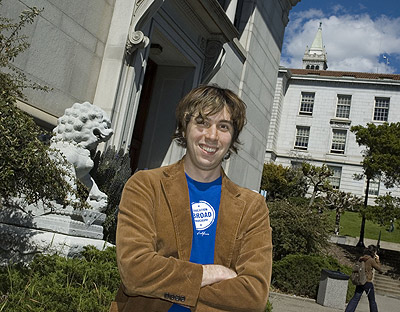Berkeleyan
 |
Whether University Medalist Lane Rettig is studying medieval history or oceanography, for a pass/fail or a letter grade, he can't bear to give less than 150 percent. (Bonnie Azab Powell photo) |
Peripatetic whiz kid with a social conscience
This year's University Medalist tempers his wanderlust and technophilia with a strong desire to make a difference
![]()
| 19 April 2006
If Lane Rettig were a cartoon, he'd be a blur. On any given day he's got groundbreaking educational software to design, inner-city children to mentor, Japanese literature to translate, new languages to master, and new countries to explore.
To top it off, the smalltown boy from New Jersey, who started his first Internet company at age 14, just landed Berkeley's highest honor for a graduating senior: the University Medal. The computer science and Japanese double major will speak at the May 10 Commencement Convocation and receive a $2,500 scholarship.
During his undergraduate career at Berkeley, Rettig has completed three studies abroad (in England, Japan, and China); worked as a system administrator; mastered Japanese; volunteered at an orphanage; and designed software to educate children in developing countries. He also dabbles in theater, karate, and a capella, and has been a mentor to fifth graders at a Berkeley elementary school.
"What impresses me about Lane ... is his supreme balance: of numbers and words, of American and Japanese, of intellectual and emotional I.Q, of serious purpose and a sense of humor," says H. Mack Horton, chair of East Asian Languages and Cultures, in his letter recommending Rettig for the medal. Rettig was awarded the Departmental Citation in East Asian Languages and Cultures for 2005-06.
Rettig, who sports a 3.96 GPA, credits the Berkeley Programs for Study Abroad for his personal and academic growth and his enormous circle of friends around the world. At the same time, he says that technology "made me the person I am, gave me the interests I have, the drive I have." He feels strongly that he has something to offer the world in the realms of technology and social responsibility: "I have this gift for a reason - to use it to make the world a better place."
Choosing the white hat
Rettig was born in New York in 1983. His father, who was 60 when Lane was born, teaches psychology at Hunter College, part of the City University of New York. His mother had studied sociology. Between them, they spoke several languages. As a boy, Rettig's father fled Nazi Germany and made his way to the British Mandate of Palestine. He eventually arrived in the United States, where he was reunited with the surviving members of his family.
"He came from next to nothing, and everything I have is thanks to how hard he's worked," says Rettig, who traveled with his father to Berlin last year.
When Rettig was 5 his parents divorced, and he moved with his mother and sister to a rural community in Elmer, N.J. He felt isolated until he discovered the Internet and, along with it, a link to the world. Beyond cyberspace, he was a loner who read books and roamed the woods around his home. He didn't have many friends. But he decided to change that when he moved to Millville Senior High School in a New Jersey suburb.
"I guess I got frustrated with being the outcast and started making friends," he says. "It was just a matter of changing my wardrobe and developing interests in sports and music."
But deep down, technology was his unwavering passion. "I was the kind of kid who wanted to take things apart," he says. "I wasn't happy just to play with a toy. I wanted to know how it worked." He took some computer classes at a community college because his high school didn't offer any. And at age 14, he and a friend ran a network of computer gaming websites, making money from the advertising revenues. He got interested in hacking and attended a couple of conventions, but ultimately decided to be a "white hat," which means a good guy in computer-security lingo.
Following his admission to Berkeley in 2001, Rettig became spellbound by the Asian influences he found everywhere and signed up for Japanese. "I was captivated from day one," he says. "I knew I wanted to go to Japan right away."
He discovered Berkeley Programs for Study Abroad, attending a summer session in British Theater in London in 2003. He followed that with a junior year abroad in an engineering program at Tohoku University in Sendai, Japan. Following a transformative visit to Hiroshima, he recalls, "I realized I wasn't happy being the sideline student observer. I wanted to make a difference."
After that, Rettig threw out a research project that had been frustrating him. He traveled to China and Thailand and visited hill tribes where people were disconnected from technology. He worked at an orphanage in Thailand and taught children English and how to use the Internet.
"I saw the same passion in those kids that I felt myself when I was that age," he says.
That set his research spinning off into an entirely new direction as he sought to bring Internet technologies to the developing world. Rettig came up with a plan to donate computing power to the Third World - to allow for imaging processing in poor hospitals, for example. He designed a simulator that proved an application would be possible but learned that the social and economic infrastructure for such an ambitious global project simply wasn't in place.
Pursuing that goal became the "big picture" for him, one that may require doing graduate studies in law or economics, he says. For now, he's working on a project with the campus Technology and Infrastructure for Emerging Regions project to use cellular phones as English-language learning tools. In the fall he starts a job in New York with the hedge fund D.E. Shaw & Co.

